9+ SAMPLE Animal Farm Business Plan
-
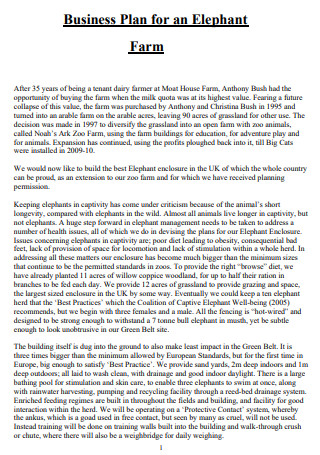
Elephant Farm Business Plan
download now -
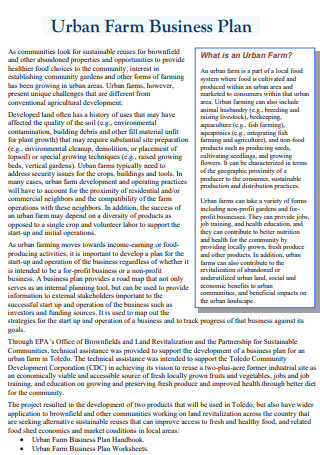
Urban Animal Farm Business Plan
download now -
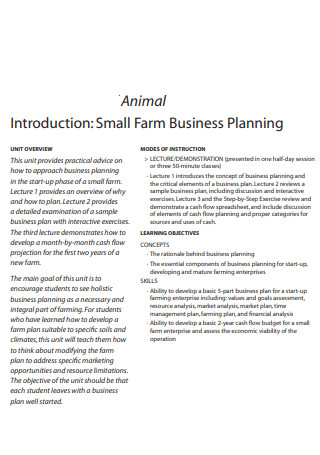
Animal Farm Small Business Plan
download now -
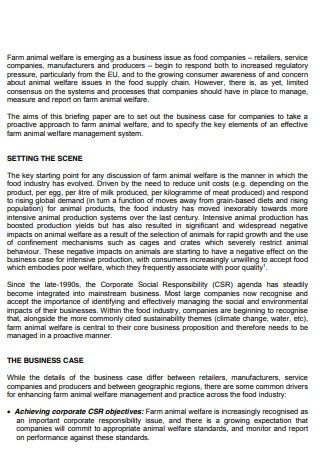
Farm Animal Business Action Plan
download now -
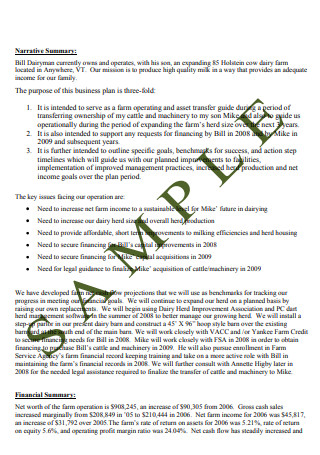
Dairy Farm Business Plan
download now -
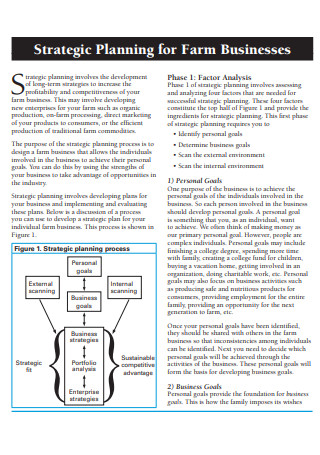
Animal Farm Strategic Business Plan
download now -
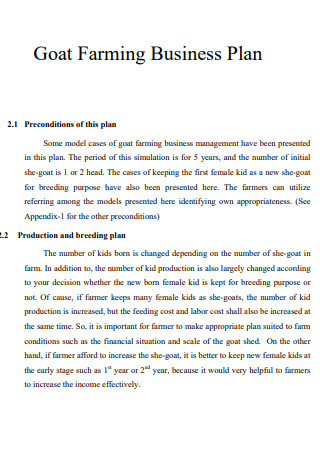
Goat Farming Business Plan
download now -
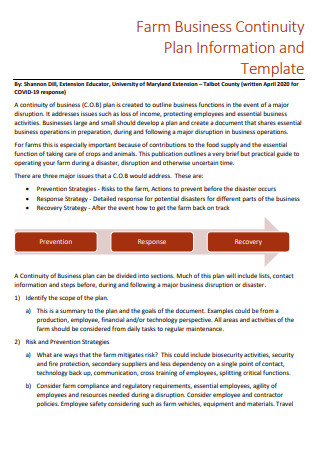
Animal Farm Continuity Business Plan
download now -
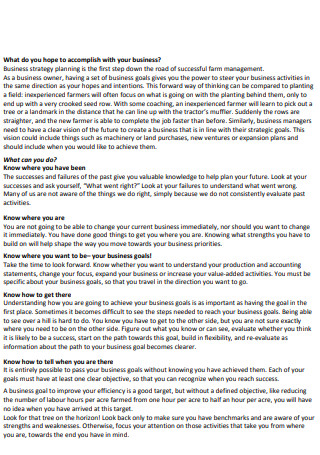
Formal Animal Farm Business Plan
download now -
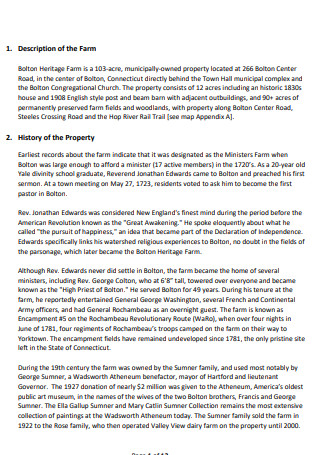
Printable Animal Farm Business Plan
download now
FREE Animal Farm Business Plan s to Download
9+ SAMPLE Animal Farm Business Plan
What Is an Animal Farm Business Plan?
What Is the Importance of an Animal Farm Business Plan?
What Is an Animal Farming?
What Are the Benefits in Animal Farming?
What Are the Types of Animal Farming?
How Do I Start My Own Animal Farm Business?
FAQs
How Much Does It Cost to Start an Animal Farm?
How Much Space Do Animals Need?
How Many Farm Animals Should I Buy?
What Breed Is Best to Buy?
What Is the Most Profitable Farm Animal?
What Is the Most Common Animal Found in an Animal Farm?
What Is an Animal Farm Business Plan?
Animal farm business plan is a well-written document or a roadmap of a business that highlights the objectives and details on the plan to achieve this goals. The first page of this business plan is called an executive summary. The executive summary of the business plan sets the main goal for the rest of the document, which includes the mission or vision statement, values and long-term goals. In addition, company description, is an overview about the farm business wherein the details on business name, years in operation, key offering and positioning statement are written. Details on the location, facilities and structure of the farm should be incorporated.
Include details on the product or services you offer towards your customers and the product/services you offer compared to your competitors. Moreover, to run your business, it must be written in the business plan the licenses and permits you need to acquire and what are the rules and regulations that will be imposed in operating the business. It must have a comprehensive plan on how are you going to protect your business from the day-to-day risk, such as loss of production, machineries, and etc. Take in consideration, the environmental issues, describe in your business plan the environmental concerns you address in your business practices. Quality control such as, how are you going to store your product/commodities or the protocol on animal treatment should also be explained.
Marketing strategy will be your over all game plan in achieving prospective consumers and turning them into customers of your product or services. Your strategy must comprise the findings about your target consumer, where do you intend to sell this product and the appropriate marketing tools that you will be using. You can also include explanation on how are you going to compete in the market by offering a less expensive but better-quality product compared to your rivals.
Thus, details about the key individuals that are involve in management and organization of the animal farm business must be entailed. You have to briefly outline the responsibilities of each person and simply discussed how are the team communicates. Professional services are also an essential part in animal farm business, you should indicates key experts or consultant that will help your business, for example, veterinarian, nutritionist and many others.
Lastly, the most essential part of the animal farm business plan is the Financial Plan which helps you know your business stand that allows you to make better informed decisions about resource allocation. Financial plan includes, a cash flow projection, income statement and a balance sheet. A financial plan will help you generate a better understanding in allocating resources and determine choices that will impact revenue.
What Is the Importance of an Animal Farm Business Plan?
Like any other business, animal farm business plan is important to ensure long-term sustainability. Business plan is an essential tool that keep you on track to reach animal farm business goals. It also serves as the evidence that your operation qualifies as a business having the intent in making a profit. Developing a thorough business plan may help identify markets to attract customers that will lead to the increase of overall demand and income.
What Is an Animal Farming?
Animal farming is also known as livestock agriculture wherein it is concerned in raising and maintaining livestock for the purposes of producing meat, milk, and eggs. Animal farming also includes wool and leather production and may include animals kept for recreation (riding and racing) and draft. In animal farming, animals are bred commercially in order to meet the high demand for food. Animal farming is large scale business. Animals are bred, cared, reared and sheltered in a farm, which is specifically built for them. Animal farming includes, poultry, milk-farms, apiculture or bee agriculture, aquaculture, etc.
What Are the Benefits in Animal Farming?
Animal farming gives you more control over nutritional and healthy products. It is also a sustainable livestock farming that does not harm the planet. Moreover, it develops valuable skills to enhance the productivity of your business. Lastly, the animal waste is used as an organic fertilizer that promotes healthy environment. Help boost the economy by contributing to GDP growth.
What Are the Types of Animal Farming?
The major types of animal farming that the world is practicing today are namely;
How Do I Start My Own Animal Farm Business?
Just because there is a constant demand for raised animal farm and the resources that these animal produce, it doesn’t mean that every attempt in animal farm business is a success. There are a lot of factors need to be consider when venturing a farm business. Yes, it may be a very profitable business, but it can also be the most taxing and demanding type of business. Before engaging in an animal farm business, here are some things to be remembered.
Step 1: State the Main Purpose
For an animal farming business to be successful, you must exactly know what you want. You need to decide first which animals you are starting and which one you will add if the business go well. This detail is important in animal farming because this will help you determine your business need such as, equipment, location, and market.
Step 2: Find the Right Location
Finding a location for your business depends on whether you are aiming for a small-scale animal farm business or large-scale farm with various animals. In choosing a location for your animal farm, you need to consider its accessibility by transport, climate, seasonal variances and most importantly, the size of the location.
Step 3: Examine Your Own Abilities
The success of your own animal farm business solely depends on your abilities. To be an efficient animal farm owner, having a good understanding of the business practices, management strategies and techniques, and the ins-and-outs of production is needed. Attending trainings allows you to established knowledge about animal farming that will help you measure your own capabilities in the animal farming business.
Step 4: Prepare Your Animal Farming Equipment
Animal farming takes more than just the perfect location and a capable owner. The success of your animal farm will also depends on the equipment that you have to run your business. Feeding equipment, water tanks, manure spreader and trailer are the basic equipment for a fully-functioning animal farm.
Step 5: Register Your Business
Registration is important in starting an animal farm business legally. Registration includes name, licenses, and permits for your business. In starting an animal farm business, it requires proper trademarks and several applications. When you register your business, it will allow you to choose a structure for your business and protects your brand.
Step 6: Market Your Products
High-quality product should be your top priority but having a good marketing strategy is the key. You need to believe in your own product, advertise and make it known among people. Customers will not find you, but rather you have to seek for them. Just like any other business, your animal farm business will surely benefit from a website, promotions, and advertisement.
Step 7: Create an Animal Farming Business Plan
It is essential to create an animal farm business plan, because these will play an important role in the growth and success of your business. Write down the strength, weakness of the animal industry, possible problems that your business might face. You should also elaborate the financial plan, labor equipment, and sized of land require. Writing a business plan will help you refocus your business strategy and goals.
Step 8: Ready Your Capital and Investment
After finishing your business plan, you will identify the amount you need for your business. You can do market research and find the best banks with low interest rates for your animal farm business. A loan will give you room to spend your money on other small tasks and day-to-day operations.
Step 9: Start Your Business
The last step is start your business. Animal farming business requires long-term commitment, hard work, and passion. It is important to invest time in the business. It will help you increase the quality, productivity, and profits of your business.
FAQs
How Much Does It Cost to Start an Animal Farm?
If you are going start with a small animal farm business, the cost ranges from 30,000 to 100,000. Outlook, location, type of equipment, size of farm, type of labor required, invested time, farm products will greatly determine the cost of starting an animal farm.
How Much Space Do Animals Need?
The space need in animal farming will depend on the kind of animal farm that you are going to create. When deciding on the space needed in an animal farm business quantity and comfort of the animals should also be considered.
How Many Farm Animals Should I Buy?
If you are a beginner, learn with five to 20 animals; no more than you can afford to pay cash for and certainly no more than you can easily feed. As you learn more about the animals and decide to continue, it will be quite easy for you to expand to a larger numbers.
What Breed Is Best to Buy?
Deciding on the breed of animal you want to raise in your animal farm will depend on your goal, where you live, what other local producers raise, your criteria for animals in your farm and your plan to raise and market the product. The best breed to buy would be the kind of farm animal that best suit to those categories.
What Is the Most Profitable Farm Animal?
There are many profitable animal farm business such as broiler poultry farming, carp fish, cattle, catfish, dairy, crab, goat, ostrich, pig, quail and many others.
What Is the Most Common Animal Found in an Animal Farm?
In terms of the total numbers, the six most common animals that can be seen in an animal farm are chickens, cattle, sheep, ducks, goats and pigs. Chicken is the most numerous type of farm animal on the planet. There are about 135 chickens for every cow and three for every human.
Animal farming can be complicated kind of business to start with. However, the demand is high and it is one of the best profitable business. Establishing an animal farm requires a lot of dedication and the ability to properly feed and care for animals. While you may enjoying being with animals, animal farm business needs to be outdoors in all kinds and perform strenuous task, one should really have the passion in doing this kind of work. This career path is not for everyone to enjoy but for those who have the heart to do it, it is ultimately rewarding.
Furthermore, if production of local feedstuffs is improved and increased and its utilization made more efficient, the number of fish culture, as well as that of land-based animal farming, are bound and expected to be more and more dependent upon the use of imported raw materials. Subsequently, the agricultural sector is of crucial importance for the region. It is undergoing a process of transition to a market economy, with substantial changes in the legal, structural, social, productive and supply set-ups, as is the case with all other sectors of the economy. In addition, the competing use with agriculture is already limiting the supply of chicken manure in major aquaculture centers although the abundant supply of livestock manure offers a possibly valuable resource if technology and economic feasibility for its use can be established and advanced. Efficiency and effectivity in feed utilization can also be better attained by making sure hydro-stability and by employing the right feeding strategies and methods.
Moreover, the streamlining of marketing channels and the development of non-conventional feedstuffs that are economically and commercially applicable to mass produce, will be specifically valuable for the feed industry. The rapid expansions in fish, poultry, and livestock farming due to the high demand and attractive profit margins will proximately result in an oversupply of products. As farmgate prices drastically fall, production costs and competitiveness of aquaculture could be improved through the greater and better use of fertilizers.
Generally, an animal farm must be operated as a commercial business with additional resources available to improve and develop effective extension activities, such as regular visits from local animal farmers and other farm stakeholders. Typical work practices that encourage wise, competent, and caring stock handlers give them the chance to develop empathy with the animals in their farm.
